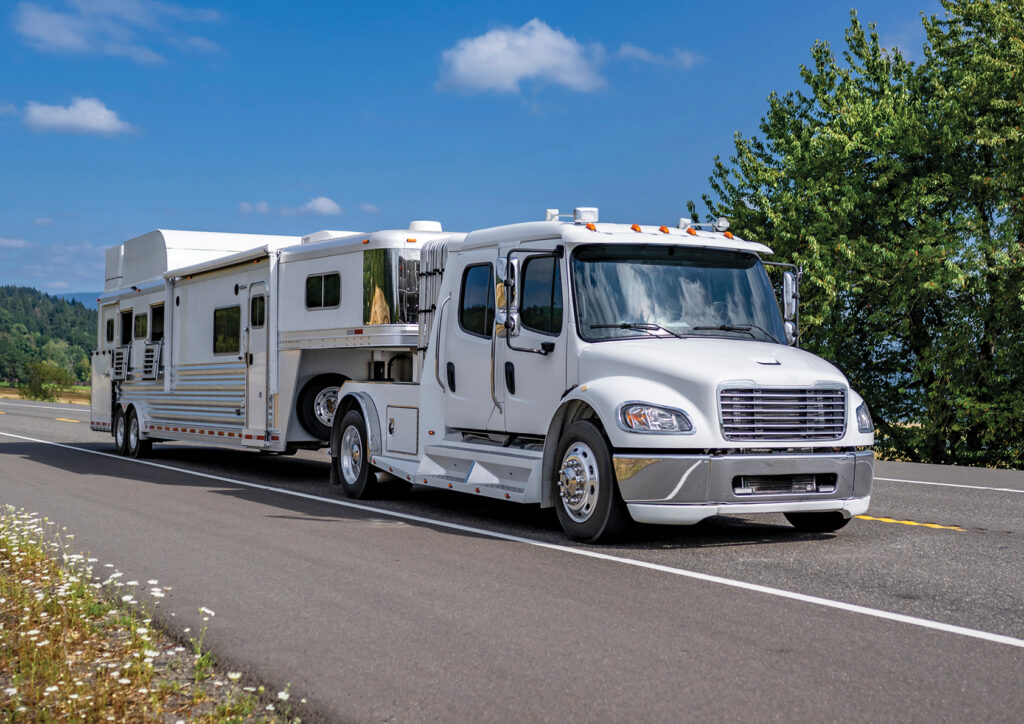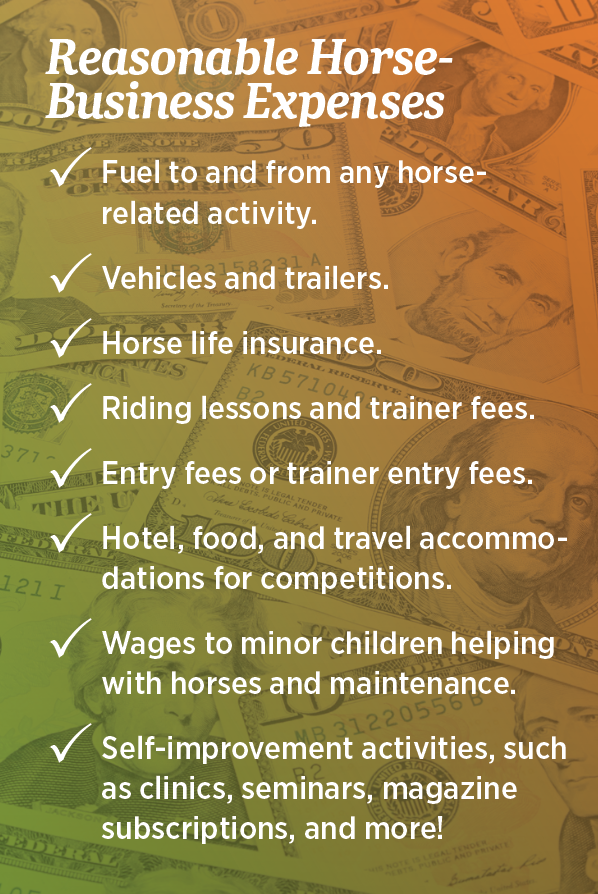Horses and running businesses around them can get expensive. That’s not new news. But there are ways to manage the cost of horse ownership. And not only by cutting corners or using tricks to stretch your dollar (hello, diluted shampoo!). While you can, and probably should be mindful of your spending, there are other ways you can make expenses work for you. It all comes down to what you do with your horses and your horse-related services. Do you compete? Or do you give lessons? Maybe you provide therapy? Do you breed and sell them?
I’ve worked with horse people across disciplines and services for decades. Every horse person has a different financial situation, and while my accounting advice is tailored to those unique circumstances, there are a few tried-and-true horse money moves that nearly every horse owner can explore to better afford your passion. If you’re new to horses or returning after a hiatus, go to Money Move Number One before progressing through the next steps. If you already have horses, compete, or provide services—even if only casually—start at Money Move Number Two.
Money Move Number One: Do Your Research
Many hobbies are expensive. The equipment, gear, or travel required to craft, trek through the woods, or see the world all have a price tag associated with them. A horse lifestyle is no different. Horses are living, breathing animals and require the basics of shelter, food, and water. That doesn’t even include the regular health maintenance, training, competition, or breeding-related expenses that occur.
If you’re interested in horse ownership or are getting back into it, the first horse money move you can make is to do your research. Find out how much it’ll cost to board, purchase hay, trim feet, and vaccinate. Then make a budget. Ask yourself, is it doable, or will it be a financial strain? Inconsistent income, high debt-to-income ratios, and burdensome cost-of-living circumstances are all indicators that horse ownership may be a “someday” versus “right now” consideration for you. Ultimately, you do a disservice to your horse if you can’t afford to care for him properly and cause yourself unnecessary stress.
And if it doesn’t make sense right now, look for alternatives. There are plenty of ways you can make your horse passion more affordable before horse ownership. Consider a partial lease, take lessons at a facility, or ride with friends if they have horses. Eventually, when you do own your horse and have an active horse lifestyle, you can think about how to protect your investment.
Money Move Number Two: Set Up a Business
If you spend more than 700 hours annually on your horse lifestyle, it may be more than a hobby. This is the magic number that separates dabbling from serious, and the rule especially applies if you offer a service, such as lessons, or generate income, such as from competition payouts. When both conditions are met, you may be able to set up a small business. This allows you to consider all income and expenses related to your horses as profits and losses toward the business rather than personal expenses and profit. When they’re personal, profit is taxable, and expenses are not deductible. So, all that money comes straight out of your pocket.
Instead, you may be able to enjoy tax benefits from your earnings and costs. But, once you decide to operate this way, and I recommend working with a knowledgeable accountant, you must go all in. Create and name the business through the state, by establishing a limited liability company (LLC), for example. Open a separate business checking account that’s associated with the business’ employer identification number (EIN) and run all appropriate horse-related expenses and earnings through the business.
Money Move Number Three: Invest in the Business
When you’re running a horse operation, just like any other business, you invest in it. You purchase a new broodmare or stallion, build a riding arena, hire a trainer, attend a clinic, purchase a new therapy horse, and otherwise pour time, energy, and money into your horses. While these investments may feel like splurges or personal expenses, they aren’t. Everything you do to upskill shows your interest in ensuring the success of the business.
If you were audited, you would want to demonstrate that you’ve done everything you can to be profitable. This is especially the case if you’re competing and spending money on your horse and entry fees. Plus, you likely want to improve, even if you aren’t winning money or increasing your income each year. If you’re a do-it-yourself rider or horse owner, keep a journal of the ways that you are investing in yourself and your business. This includes research on the internet, reading magazines (and articles like this one!), attending webinars, shadowing other professionals in your specific niche (e.g., farriers), and re-watching competition videos.

Money Move Number Four: Keep Thorough Records
Horse businesses are often more heavily scrutinized because so often horses are just a hobby. For this reason, it’s essential to keep detailed records of your profits, losses, and expenses. If audited, a business would need to produce records between three and five years old. It can be difficult to recall specifics from long ago, so it’s helpful to keep a journal. The documentation doesn’t need to be lengthy paragraphs, but it should record information, such as the date, the expense or profit, the provider, mileage, and other important supporting details.
Keep all horse-related receipts and write a note on the top for yourself, such as fuel to go visit horse in training or fuel to check out a new piece of equipment, even if you didn’t make a purchase. Checks and credit card payment confirmations aren’t enough by themselves. Be sure to request proper invoices from service providers like your trainers, breeders, vets, boarding facilities, and farriers. Keep receipts and invoices in a safe and findable place.
In your journal, also document your business plans and approach. This will help you adequately explain your outcomes—success or failure. For each horse that’s a part of the business, explain what they’re used for and when. For example, Hank the gelding with D.O.B. was used from May through September for paid trail rides and guided packing trips. Unfortunately, the horse must have a business purpose to be considered. They can’t just be a backyard pleasure animal to be an asset—even though you might feel they are.
If this level of detail and documentation takes the joy out of the experience or if it’s too tedious, it’s best to treat your horse adventures as a hobby, even if you win money. This is because if you were to be audited and get in trouble with the IRS, you would pay more penalties than you’d save in annual income taxes by running a business. Instead, focus on budgeting and expense management.
Money Move Number Five: Explore Deductions

Many daily costs associated with running your horse business are deductible, from the gas needed to haul your horse to the trainers to the depreciation of your animals, facilities, and vehicles. That’s why it’s important to keep a separate checking account and documents to validate those expenses. Work with your tax professional to determine the tax deductions you qualify for. I’ll share two that are commonly overlooked and considerations to make.
The IRS allows ordinary and necessary costs of insurance to be written off. Ordinary is defined as expenses common for your industry and necessary costs are expenses considered helpful and appropriate for your business. This includes horse life insurance, and towing vehicle and trailer insurance. Performance and breeding horses, and especially those that are high-value and that travel, should be insured. When you purchase insurance, be sure that the agent understands what you do with the horse and their asset value so that they’re insured correctly. To check, look at your policy. Your insured horse or horses should be found on the policy at the appropriate amount. This protects your investment if something horrible were to happen.
If you have kids and they help you, you may be eligible for a tax deduction to pay them for reasonable support. Each child 17 and under can be paid up to $13,850 each year for tasks such tasks as feeding, watering, cleaning stalls, exercising horses, and other age-appropriate chores. So, your two-year-old can’t be paid for feeding but your 15-year-old could be paid for unloading and stacking hay, for example. Your kids won’t have to pay taxes on this income either, making it a great way to build their school fund or pay for a first car.
Money Move Number Six: Find a Knowledgeable Tax Professional
In your middle years of life, between 30 and 60, you’re at your peak earning potential. As you file your taxes, and especially if you have more complex considerations, such as small-business income, which is what your horse operation will be considered, it may be worth working with an accountant. Look for someone who doesn’t just have the appropriate credentials, but who is also curious about your tax life. When they understand the nuance of your life, goals, and income streams, they’ll be able to make recommendations to manage your taxable income. The same is true for seniors. Social security income alone isn’t taxable. However, if you have pension income and earnings from your horse business, you may be required to file.
Finally, if your horse life is also your business, you’ll want an accountant who is knowledgeable about horses and the horse industry. It doesn’t matter if the experience is in a different discipline. They need to be savvy enough to know that trims are an expense and that geldings cannot be considered breeding stock. Since you’ll be running a small business, you’ll likely file taxes quarterly as well as annually. Talk to your accountant frequently, and especially if you’re having a more profitable year to ensure that you aren’t missing deductions.
Finally, if you get audited, and you may with a horse business, don’t represent yourself. Even if you file your taxes on your own ordinarily, a knowledgeable accountant will help you navigate the detailed and sometimes difficult audit process. The goal of a tax professional is to be your advocate.

